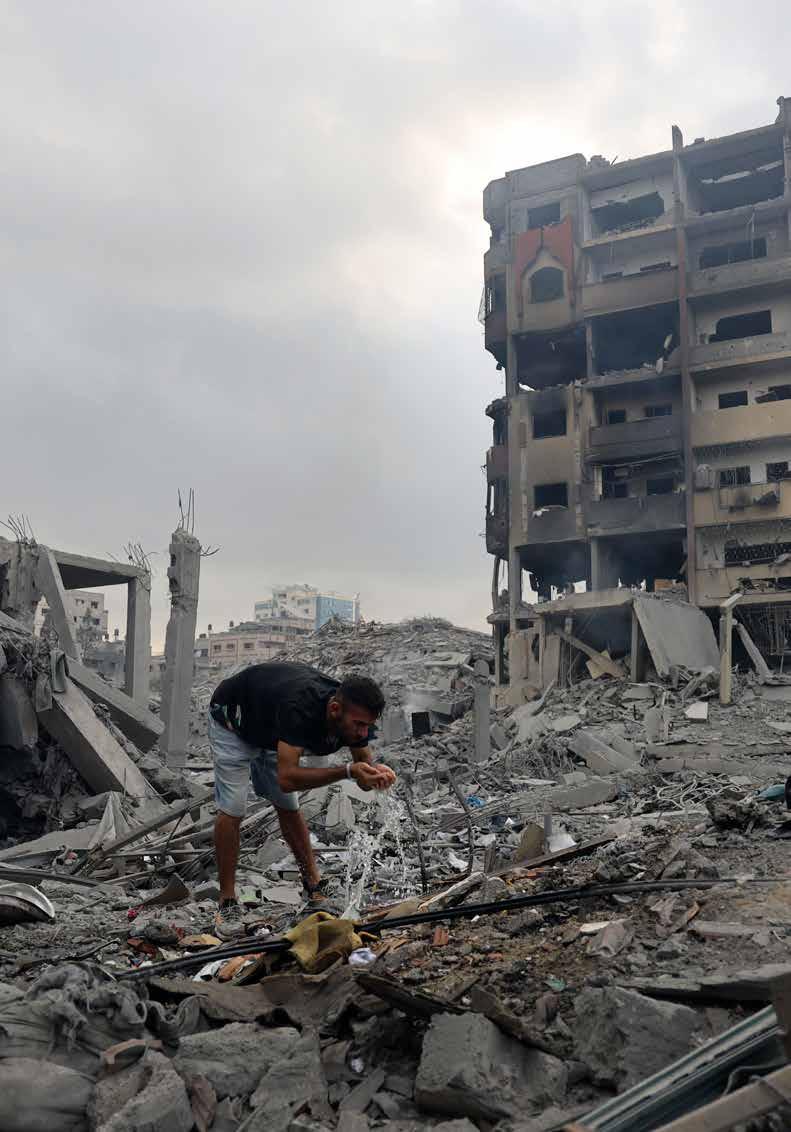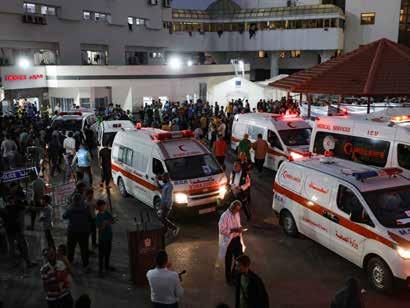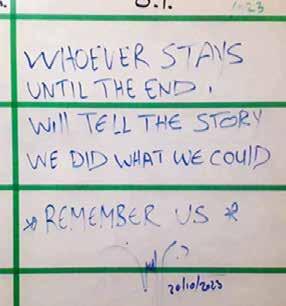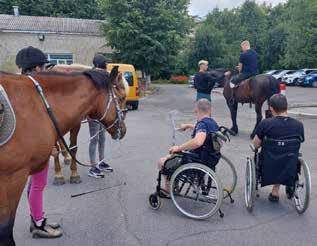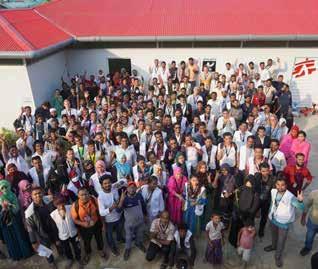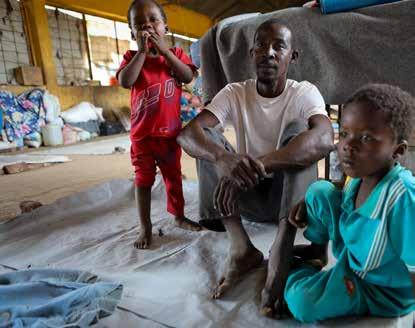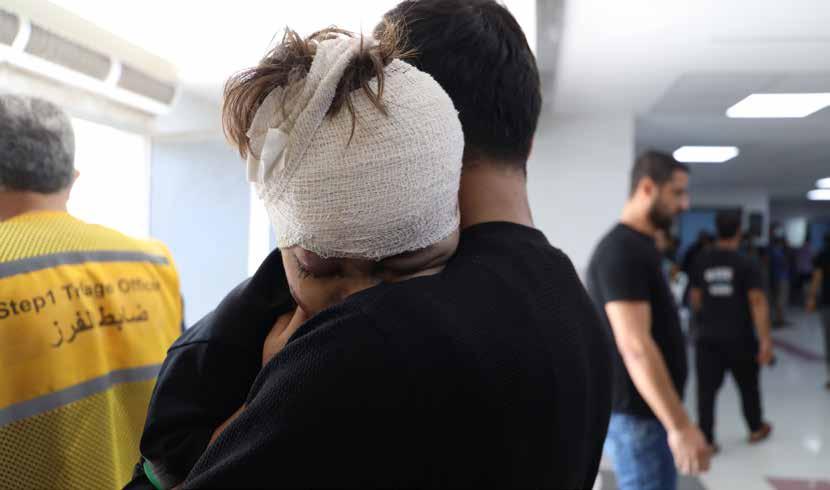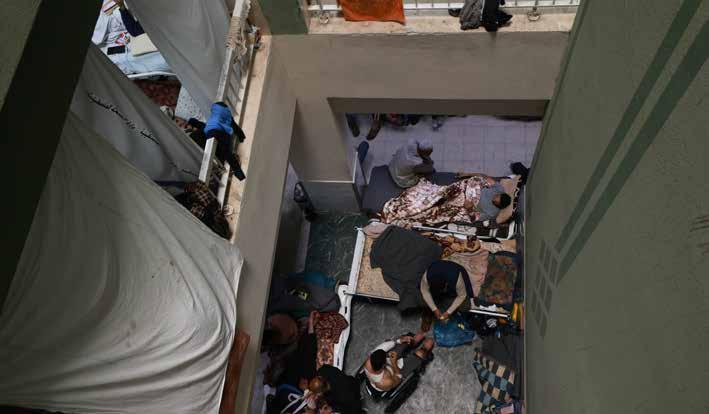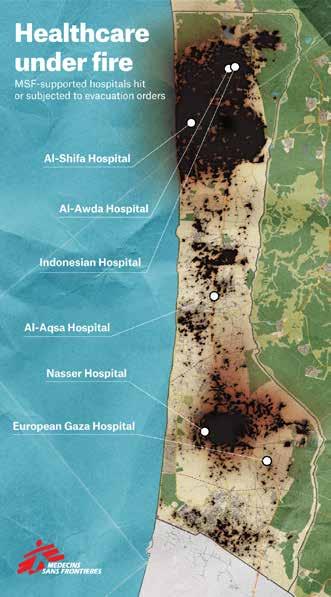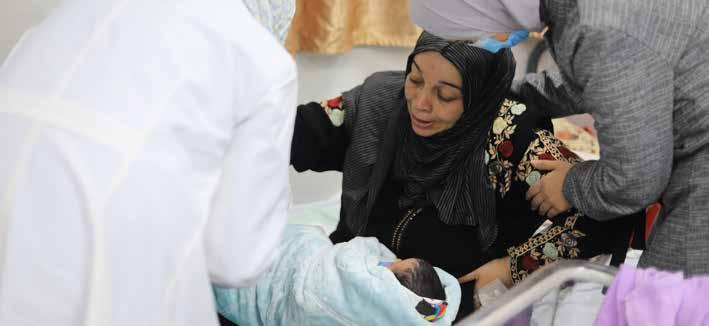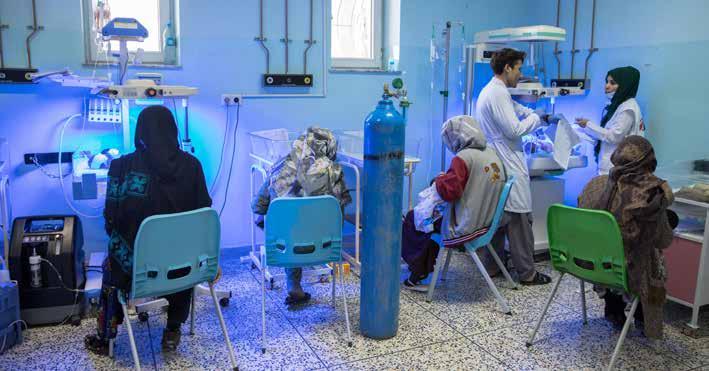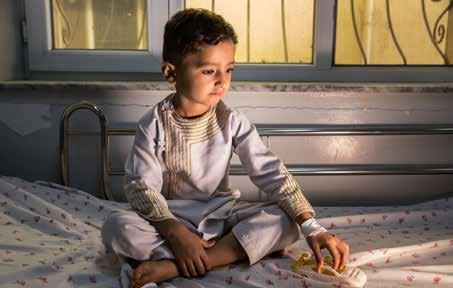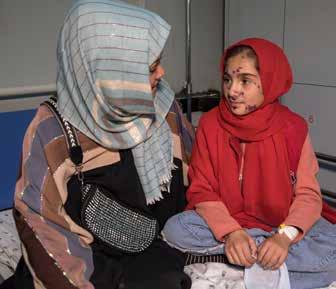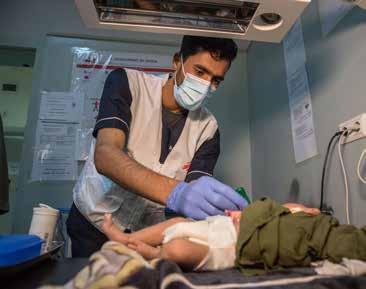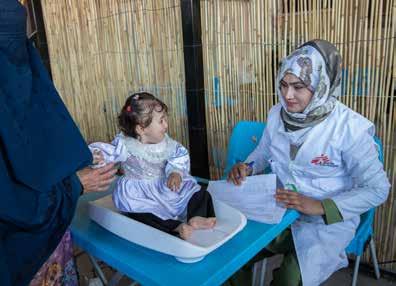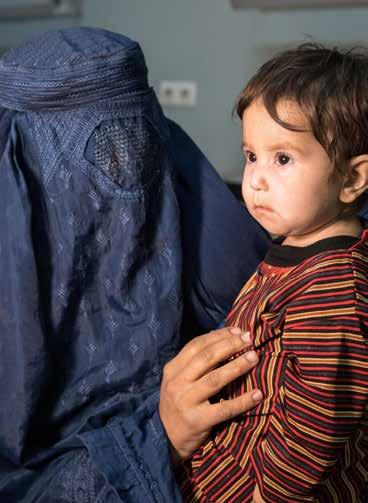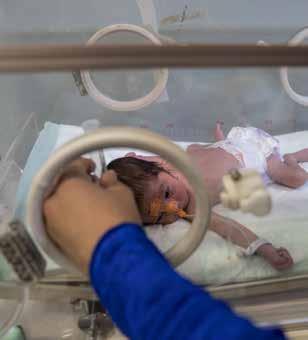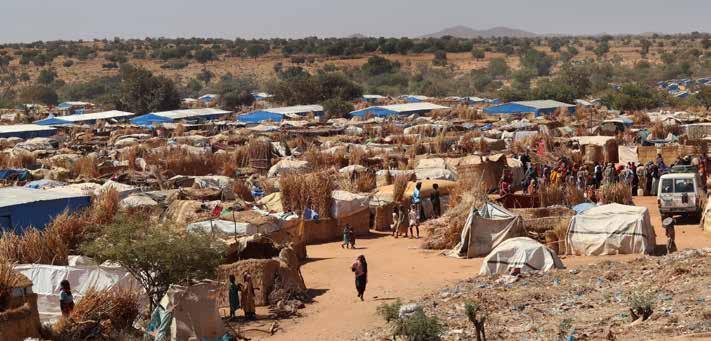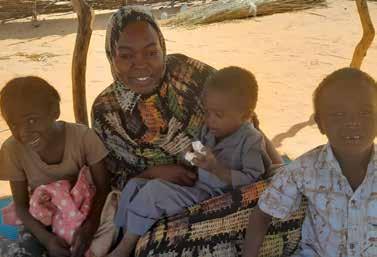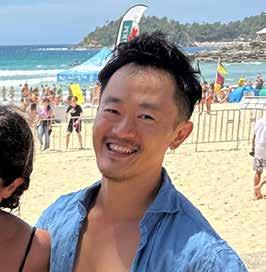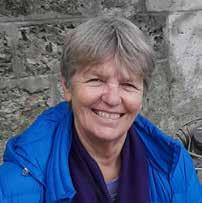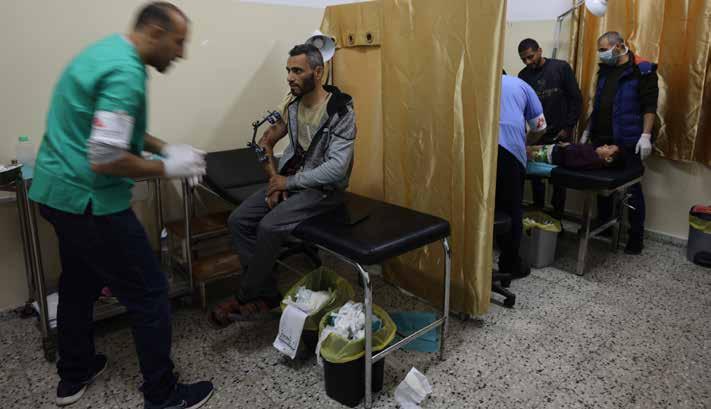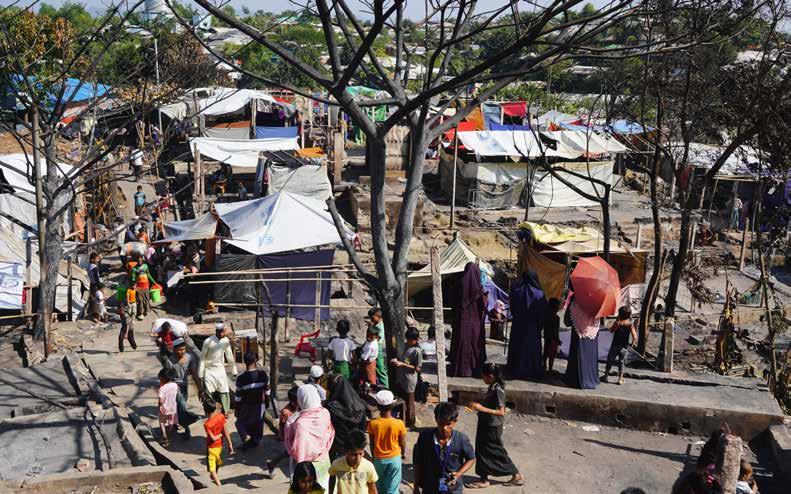The erosion of humanity and its witnesses
The assaults on healthcare and civilians in Palestine set a new, chilling precedent for the way wars are waged.
One night in November, I sat in my Sydney home listening to the voice of Dr Mohammed Obeid, a Palestinian Médecins Sans Frontières (MSF) surgeon speaking from Gaza. In the hours prior, he had recorded a message from Al-Shifa hospital, once Gaza’s main medical complex, as he, his colleagues and patients came under siege. I’ll share his words with you.
“The situation now is very bad. We don’t have connection, there is no internet. Sometimes we have some [cell phone reception]. We’re on the fourth floor... there’s a sniper who attacked four patients inside the hospital. One of them has a gunshot wound directly in his neck, and he is a quadriplegic [patient]. And the other one [was shot] in the abdomen. Some of the people who go outside the hospital – they want to go to the south – they bombed them also. They bombed their families.
“In Al-Shifa hospital today, since this morning, there is no electricity. There is no water. There is no food. Our team is exhausted. We have two neonate (newborn) patients who died because the incubator is not working, because there is no electricity.
“We can see the smoke around the hospital. [Israeli forces] hit everything around the hospital, they hit the hospital many times… we are nearly sure that we are alone now. No one hears us.”
As I write this four months later, I am in total disbelief. MSF has witnessed decades of occupation in Palestine, but following Hamas’ horrific attack on Israeli civilians on 7 October, Israel’s blanket siege of Gaza has shocked me and so many others to our cores.
One of the most shocking features of the bombardment of Gaza has been the repeated evacuation orders, attacks and sieges against hospitals and the people inside them. This includes the MSFsupported Al-Shifa and Al-Awda hospitals in the north, and Nasser hospital in the south, to name a few.
Of 36 previously fully-operational hospitals in Gaza, only 12 were partially functional by the start of March, according to the World Health Organization. Medical staff are working in harrowing conditions, beyond anything I have known in my experience as a humanitarian, while the medicines and supplies they urgently need are blocked from entering Gaza.
Doctors amputating children’s limbs without anaesthesia; nurses swaddling premature babies with blankets after the power to their incubators was cut; health workers forced at gunpoint to abandon patients too sick or injured to evacuate.
At least five of my Palestinian colleagues have paid for their work with their lives. On 21 November, MSF doctors Dr Mahmoud Abu Nujaila and Dr Ahmad Al Sahar were killed as they were caring for their patients in Al-Awda hospital, when a strike hit its third and fourth floors. In early December, Israeli forces stormed the hospital and took control of it, arresting and interrogating all men above 16 years of age, including six MSF staff. Al-Awda is now barely functional.
“Israel’s unrelenting assault has
killed
entire multi-generational families and destroyed whole neighbourhoods.”
Attacks on health workers and patients represent one part of a larger systematic targeting of civilians in Gaza.
Israel’s unrelenting assault has killed entire multi-generational families and destroyed whole neighbourhoods. Civilians have been bombed as they tried to flee along ‘safe’ routes; residential apartment blocks, refugee camps and schools flattened; and people denied all the basics needed to survive.
Since 1949 the humanitarian community has worked under the basic understanding that international humanitarian law would provide guardrails to protect civilians, property and healthcare during war. Violations of humanitarian law are not new (in Gaza or elsewhere), but as flagrant and sustained an assault on these laws as in Gaza is tough to identify. I fear the legacy of this war will have a lasting and horrific impact on the way others are waged.
Gaza is not the only place where such violations are occurring. In the war in Sudan, atrocities against civilians have become a shocking regularity under a cover of miniscule international attention. Refugees fleeing West Darfur have reported massacres, the burning of homes, beatings and sexual violence, as well as the specific targeting of the Masalit ethnic group, to MSF. Eight million people have been displaced.
MSF is continuing to work in 11 states, but people are increasingly cut off from care. Up to 80 per cent of hospitals in conflict areas are no longer functioning, and in some areas including Khartoum, the entry of medical supplies and humanitarian workers has been blocked.
As MSF, we always stand with patients. The suffering of people in Gaza and in Sudan should devastate and outrage us all. Attacks on civilians, and on the healthcare and other basics they need to survive, are a stain on humanity. Let us come together to unequivocally condemn them.
Jennifer Tierney Executive Director, MSF New Zealand
Ambulances carrying victims of bombings crowd the entrance to the emergency ward of the Al-Shifa hospital in Gaza on 15 October. © Dawood Nemer/AFP
MSF’s Dr Nujaila’s words on a whiteboard in Al-Awda hospital, where he was later killed. © MSF
This article includes descriptions of violence.
Rebuilding in the Rohingya camps
On 7 January a fire broke out in Camp 5 of the Cox’s Bazar refugee camps, destroying nearly 900 shelters and damaging hundreds more. The blaze left 7,000 Rohingya people without homes and possessions. In the immediate aftermath, MSF responded with psychological first aid and coordinated with other organisations to assess people’s needs, while refugees from other parts of the camps donated clothes and food.
This fire was the second to affect the camps in 2024; Camp 11 was set alight the previous week. The fires are yet another challenge on top of countless facing the Rohingya community in Bangladesh, as 1.2 million people approach seven years of displacement in the Cox’s Bazar camps.
In some positive news, in December 2023, MSF reopened our Balukhali clinic inside the camps more than two years after a devastating fire destroyed it. Balukhali clinic provides outpatient services focusing on sexual reproductive health, including care for victim-survivors of sexual and gender-based violence, and mental health including psychiatric care. It is also a hub for vaccinations, health promotion, water and sanitation activities and the humanitarian affairs team.
MSF operates 9 medical centres and 2 standby multi-outbreak centres in the Rohingya refugee camps
MSF suspends activities in Wad Madani
UKRAINE
Rehabilitating war-wounded patients
After 18 months of activities, training and mentoring, MSF has handed over our project providing physiotherapy and psychological support in two hospitals in Kyiv and Vinnytsia. The project, in collaboration with the Ministry of Health and Ministry of Internal Affairs, supported patients with severe war injuries including amputations, multiple traumas and nerve injuries.
MSF invited physiotherapists with experience in other armed conflicts in Afghanistan, Yemen, Palestine and Sudan to contribute to the training and capacity-building of Ukrainian medical staff and university students.
The support focused on evidence-based and progressive methods of physical rehabilitation. In the mental health team, patients attended recreational trips to the zoo and cinema, or were visited by trainers with horses and dogs to aid in their recovery.
A medical non-governmental organisation will continue the project.
From mid 2022 to end 2023, MSF provided:
19,000 physiotherapy sessions
2,638 psychological sessions
More than half a million people fled violence in Wad Madani after the Rapid Support Forces (RSF) launched an attack on the city and took control of several other cities and areas in Al Jazirah state in mid-December. On 19 December, armed men attacked the MSF compound in Wad Madani, looting two cars and other items from its premises. Due to this attack and the deteriorating security in the weeks prior, MSF took the difficult decision to suspend our activities in Wad Madani and evacuate our staff. We also evacuated staff from Damazine (Blue Nile state), Um Rakuba (Al Gedaref state) and Doka (Al Qadarif state).
We were able to return to Wad Madani in January, where we are now working at the Teaching Hospital. MSF began working in Wad Madani in May 2023, soon after the war between the Sudanese army and the RSF began in April that year. Teams were mainly working from mobile clinics in schools or old public buildings housing displaced people. Hundreds of thousands of people had sought safety in Wad Madani after fleeing Khartoum state, where 11 months of fighting has decimated Sudan’s capital. After the attack on Wad Madani, thousands of people were uprooted once more to Gedaref and Kassala states, where MSF provided aid.
MSF is still running activities in several states including Khartoum, Omdurman, White and Blue Nile, Al Gedaref and West, North, Central and south Darfur.
BETWEEN MAY AND NOVEMBER, MSF PROVIDED:
18,390 medical consultations
40% were for children under 15 years old
Using AI to treat snakebite
A pilot project designed by MSF and the University of Geneva is using Artificial Intelligence (AI) recognition software to help MSF teams identify snake species and select the appropriate treatment for patients who have been bitten. The technology aims to assist staff to distinguish venomous snakes from common snakes. This can be challenging – some non-venomous snakes are known to mimic venomous ones. The tool has been fed with thousands of snake photos to help it distinguish between species.
In South Sudan, MSF teams treat about 7,000 patients for snakebite envenoming every year. Snakebite envenoming is a deadly neglected tropical disease and can kill quickly. Speedy identification of the correct antivenom can be lifesaving for many patients.
Alongside advocacy to improve the safety, affordability, and polyvalence (effectiveness against multiple snake venoms) of antivenoms, this innovation can pave the way for better treatment.
SUDAN
SOUTH SUDAN
Patients interact with horses during a visit to the rehabilitation project at Vinnytsia hospital. © MSF
The MSF Balukhali clinic team in Cox’s Bazar, Bangladesh. © MSF/Jan Bohm
Father of three, Al Bakri Al Taher Malik sought treatment at the MSF clinic in Wad Madani, where he fled from his home state, Khartoum, after surviving a shooting and being hit by shrapnel from a bombing. © Fais Abubakr
War on Gaza
The siege on Gaza has caused catastrophic suffering and killed tens of thousands of people, while in the West Bank, Palestinians face intensifying violence. This story includes descriptions of violence.
When Jabalia refugee camp was bombed, Shorouk spent one hour under the rubble. “I thought my whole family was killed—my husband and children,” she says.
“Finally, they heard my weak voice. I was under multiple metal objects which broke my leg. While they were getting things off me, I swallowed a handful of stones. I couldn’t breathe. In our area, we had 400 [people] dead. It was a big massacre.”
Then, the area around the hospital was bombed. The family, including Shorouk with her broken leg, walked to Gaza’s Middle Area around 20km away. When they were ordered to evacuate that area they kept moving. It was a week before Shorouk could have surgery on her leg.
Catastrophic injuries, children not spared The severity of people’s injuries in Gaza—particularly those of children—are extremely confronting and haunting, says Dr Natalie Thurtle, a Sydney-based emergency physician who was in Jerusalem in November and December to coordinate MSF’s medical activities in Gaza.
“I was hearing about the children who are dead on arrival, children who’ve got rotting limb injuries from very delayed presentation to care, from being bombed. [There are children] who need anaesthetic but they wake up from surgery [screaming].”
In Gaza, treating war-wounded patients is extremely complicated as blasts from explosive weapons and collapsing buildings create multiple, simultaneous injuries on many parts of people’s bodies. Israel’s complete siege of the enclave has made it impossible to access medical tools and essential drugs, including pain management drugs, which are critical in surgical interventions.
“I haven’t seen this severity of injuries in the previous wars [in Gaza],” said MSF reconstructive surgeon Dr Hafez Abukhussa from Nasser Hospital in November. “They are major cases and all the cases include burns. Can you imagine to receive 100 or 200 cases a day—sometimes 500 injured patients a day? The other hospitals have been evacuated, all the patients come to us. What hurts me [is] when I see an innocent child injured, he needed a major surgery, he lost his limb, and he’s the only [remaining] in his family. And when he woke up he asked to see his family.”
“He lost his limb, and he’s the only [remaining] in his family.”
Denial of food, water, fuel
For people who have survived the bombs, every day has been a struggle for survival due to the blockade on everything needed for life in Gaza—including food, water, fuel and electricity. Only a small trickle of humanitarian aid has been permitted to enter.
By late December, the UN refugee agency warned that 40 per cent of Gazans were at risk of famine. “It is very tough,” one woman in a displacement camp told MSF. “We have a hard time finding bread for the kids, and if we get some we divide it to feed the family. Other than that, [we face] difficulty [obtaining] water, especially fresh water.” People have been forced to drink sea water and rainwater.
Most people have moved several times to flee attacks, with no options but to build makeshift shelters directly on roads or in front of shops, or to seek shelter inside hospitals or schools, despite the freezing weather and rain—with no guarantee of safety. In unhygienic and crowded conditions, infectious diseases such as diarrhoea, acute respiratory infections and hepatitis are increasingly reported.
airstrike.
© Mohammad Masri
Gaza: home to 2.2 million
people
Shorouk was put in an ambulance and taken to the Indonesian hospital in the north, but they didn’t have any painkillers. The hospital was overwhelmed with injured patients coming in. “It was so hard,” she says. “I told [the doctors] I preferred to die.”
Decades of repression and conflict, and an Israel-imposed blockade from 2007 on Gaza, exploded on 7 October as Hamas attacked Israel on a large scale. In response, Israel launched massive attacks on Gaza.
By March, Israeli airstrikes and ground operations had killed at least 30,000 Palestinians, 12,300 of them children. Thousands more people are missing under the rubble.
Gaza is a 365km area surrounded by walls and fences, and bordered by the Mediterranean Sea to the west, under the constant control of the Israeli authorities. Gaza has been under blockade since 2007: the entry and exit of people and goods, including clean water and many vital supplies, are strictly controlled. MSF has been working in Palestine since 1989. Prior to this war, in Gaza we provided comprehensive care including surgery for people with trauma wounds and burns.
Patients and their family members line the hallways of the MSF-supported Al-Aqsa Hospital, in Gaza’s Middle Area. © MSF
A young boy is held by his father at the MSF-supported Al-Shifa hospital in Gaza, where he was treated after being injured by an
Giving birth in tents; without medical care
Around 50,000 women in Gaza are pregnant (WHO). Every day women are giving birth in deplorable, unhygienic conditions, in plastic tents and public buildings. Even those delivering in a hospital are discharged after only a few hours due to the hospitals being overwhelmed with needs. The first 24 hours after delivery are the most critical to avoid complications or infections.
In Rafah, south Gaza, MSF is supporting Emirati Hospital which remains the main facility covering the maternal health needs of over 1.5 million displaced people.
One patient, Mona, gave birth there in January. “I was displaced from Jabalia Al Balad to Rafah. The only shelter we found was in the schools of Rafah. I was having a complication with my pregnancy. There was no hygiene or proper care. We were surprised to find a department run by MSF.”
Snapshot: MSF’s work in Palestine
Gaza:
• Al-Awda Hospital: several MSF staff working there autonomously
• Al-Shifa Hospital: MSF staff were forced out on 18 November; two nurses returned voluntarily to help until early February
• Al-Aqsa Hospital: wound dressings and consultations for blast injuries and burns; surgical support; 955 patients treated for wounds and burns in December.
• Nasser Hospital: emergency and surgical treatment of trauma injuries and severe burns
• European Hospital: surgical support, including wound dressing
• Rafah Indonesian Hospital: outpatient department support with wound dressings and physiotherapy
• Al-Emirati Hospital: maternity care support, including for women with complicated pregnancies
• An-Nanjar Hospital: surgeries and wound care
• Martyrs, Beni Suhaila and Mascat clinics: support suspended after forced evacuation on 1 December
• Al-Shaboura clinic: general consultations, reproductive healthcare, mental health and malnutrition screening
• Water distribution point support: 80,000 litres provided per day in December
• 75 tons of medical supplies sent into Gaza in three deliveriesmainly surgical and dressing kits
West Bank:
• Hebron: mental healthcare including psychological first aid, counselling and psychotherapy; medical care via mobile clinics; emergency response capacity building
• Nablus and Qalqilya: psychological individual and group therapy; psychiatric consultations
• Jenin and Tulkarem: support for emergency rooms of two Ministry of Health hospitals; donations and training for volunteer paramedics in refugee camps; emergency response support
Maternal healthcare has been completely disrupted by the attacks on health facilities and the dire lack of humanitarian aid, putting the health and lives of mothers and their children at grave risk. “For people who need to have a managed birth and need to have medical help [with] their birth, that’s not consistently and sustainably available,” says Dr Natalie Thurtle.
“Urgent care is essentially not happening [for women in labour].”
Pregnant women don’t have access to enough food, water or proper shelter. Many have not received any healthcare since the start of the war. On top of this, menstruating women cannot access sanitary products, are sharing toilets with tens or hundreds of others, and don’t have access to water to shower or keep clean. “That may not be the most dramatic manifestations of the war but it’s still extremely dehumanising,” says Natalie.
“Dad, why do you let me starve?”
Over 6,000 Palestinians from Gaza who worked in Israel prior to October have become stranded in the West Bank since the start of the war. Abbas* is one of them. He spends his nights thinking of his wife and children under the bombs in Gaza. “Every morning at dawn, I try to reach them by phone to know if they survived the night. Some days, communications are cut off and I have to wait to hear from them.”
“All my family is in Gaza, scattered between the north, and Khan Younis and Rafah in the south. My wife and kids are living in a tent: they have been displaced four times since the start of the war. At times they slept in the street, in mosques or abandoned buildings. My four children are between five and 14 years old, can you imagine?”
After Hamas’ attack on 7 October, Israeli soldiers came to the factory where Abbas worked, threatening to shoot the workers if they didn’t flee to the West Bank. Abbas is now trying to go to Gaza to join his family, but it has been impossible. Although the Israeli authorities said they would allow Gazan workers to return, Abbas says those who tried were arrested, robbed, interrogated and beaten. “My five-year-old asked me the other day, ‘Dad, why do you let me starve? Dad, other kids, their father died with them, so don’t let us die alone.’”
Abbas is accessing mental health support with MSF in the West Bank. While Gazans are being bombed, Palestinians living in the West Bank are suffering increasing attacks by Israeli authorities and settlers. These attacks were already rife before 7 October (2023 was the deadliest year for Palestinians in the West Bank according to the UN), but now, Palestinians are shot, beaten or arrested on a daily basis.
Meanwhile, Israeli military incursions in the Jenin and Tulkarem refugee camps have killed many people since October; hundreds of attacks on healthcare have been documented including the targeting of staff, patients, ambulances and health facilities. Between October and end of January, 361 Palestinians had been killed in the West Bank and East Jerusalem, including 92 children.
An ocean of need
Medical workers have only been able to help with a tiny fraction of the needs in Gaza, due to the immense suffering caused by the siege on its people and the impossibility of getting aid into the Strip. “Our impact is very, very low because there are almost two million people in need of healthcare,” says Enrico Vallaperta, an MSF intensive care nurse who supported in Gaza.
The recovery will be long, especially given that Gaza’s health system was already under intense pressure before this war. Many adults and children have life-changing injuries, such as extreme burns, or major fractures requiring multiple complex surgeries, long rehabilitation or amputation. People will also require long-term management of severe chronic pain.
Health workers like Dr Hafez Abukhussa will continue to support their patients. “We know we are in danger any time,” he said in November, “but we will keep doing the same.”
340 health workers have been killed in Gaza
1,000 Gazan children have lost both or one of their legs
Gaza’s entire population faces crisis or worse levels of food insecurity 75% of Gazans have been displaced
MSF medical staff help a mother and her newborn baby at the Emirati hospital in Rafah. © Mariam Abu Dagga/MSF
Note: In Gaza, as of January 2024
Inside a hub for children’s care in north Afghanistan
The Mazar-i-Sharif Regional Hospital is the only medical facility in Balkh province where people can access tertiary medical care. Here, MSF in collaboration with the Ministry of Health aims to reduce paediatric and neonatal mortality rates in Afghanistan’s northern provinces, in the face of overwhelming demand, a strained healthcare system and a shortage of resources.
Marwa, who has chicken pox, with body aches and a fever, sits with her mother Nadia. They were unable to come to the hospital when Marwa’s symptoms began almost six days ago, due to lack of money for transport.
Six-year-old Arsalan in the MSF-run paediatric emergency room, where he is receiving treatment for symptoms of fever, diarrhoea and vomiting.
A nurse examines young Abed in the emergency room. He was brought to the hospital by his grandfather, a journey which took them an hour by taxi. He needed surgery for a neck deformity, which is only available in Pakistan.
In the neonatal intensive care unit (NICU) the average bed occupancy rate is consistently over 140 per cent. The care that MSF NICU staff provide includes support for preterm babies with low birthweight, perinatal problems or congenital abnormalities.
A nurse weighs a young girl in the screening room during triage. Afghanistan’s health system has long endured understaffing and underfunding, and these challenges have increased since the Islamic Emirate of Afghanistan (the Taliban) assumed power in August 2021 and funding was further reduced or withdrawn.
Anissa feeds her daughter, Marhaba, born prematurely at seven months. Premature babies are often hospitalised for long periods, which can be extremely difficult for families. Many mothers remain alone with their baby in hospital for weeks, as they have travelled far to reach the hospital.
“I really don’t know the pain she’s going through, but I am here with her hoping she gets better soon,” says Farida of her daughter Hadia. She took Hadia to several health facilities and doctors prior to coming to MSF, but her condition never seemed to improve. Hadia is now receiving treatment for severe acute malnutrition at the hospital.
All photos © Oriane Zerah
“I was barefoot when I arrived here in Adré.”
As the war in Sudan escalated in 2023, Hanadi Yasin was forced to flee West Darfur with her family, leaving behind their livelihoods and the safety and comfort of their community. Now in Chad, Hanadi has found a way to help, using her considerable skills, as an integrated community case management (ICCM) volunteer with MSF.
This story includes descriptions of violence.
At the beginning of the war, there was so much shooting and heavy fighting, and the enemy entered our homes. At the start, we used to close our doors and lie down to avoid the bullets [but] after that they began to jump the fences into homes, beating people and stealing property and burning down homes. They wouldn’t care about the people who might be in the homes they burned.
We lost [..] young men, because the enemy didn’t want to see any men around. They would beat any young man they saw. They would shoot them, beat them with sharp objects; some people were basically slaughtered.
We couldn’t stay in this environment. I personally lost young men who had been living with me since they were primary school students. One was hit and killed outside the house. The other was killed inside the house. I was not there but I was told there were other dead people in my house—probably family and neighbours who had sought refuge in my house, but they were brutally murdered.
After this we left. All the roads from El Geneina to Chad were scattered with bodies as well as [marked by] the beatings and all the horror. They did not differentiate between children, women or men. They didn’t even bother to talk to the men; they would beat them and kill them. They would beat the women and take everything they carried. They would take your food—even the water they have for the little kids. They would rob the clothes off your back.
“If I can have a chance, I plan to get my Doctorate.”
In El Geneina we were settled and living among our families and friends. But since fleeing to Chad, you have family members living apart: some in Ourang and some in Adré or the new camp in Alacha. There is no unity like before. Everyone is separated and to stay in touch is difficult.
Thank God I am happy to be able to serve and help people who are in need. This is a good thing, and I am happy to be able to help the community. Because they are my people, and I am happy to be able to do something for them. I am relieved.
It is difficult here in Ourang. It is very hard to build a future here. I graduated with a general education degree majoring in geography and history from Zalingei University. After my Bachelor degree I started my Master’s. I worked as a teacher in primary and high school.
Being forced to flee to Chad, I could not continue with my studies. If I can have a chance, I plan to get my Doctorate. It is difficult to do so in this environment, so I hope to be in a better place to improve myself and for my kids to learn and grow in a healthy environment. My wish is for my kids to have a good education and a bright future.
Ourang refugee camp was established in eastern Chad in response to the Sudanese war and the flight of people across the SudanChad border. It hosts approximately 50,000 people. MSF handles water services and built the only hospital in the camp, where we run inpatient and outpatient services. We have also augmented our response by introducing community-based healthcare for the first time in an emergency response. We have trained 25 community leaders to date like Hanadi, mostly mothers, who are now able to deal with mild cases of malaria, non-complicated diarrhoea, and implement nutritional screening. Their work makes healthcare more accessible to people in Ourang, and complements the hospitalbased services to reduce sickness and prevent health concerns becoming more severe.
Hanadi Yasin’s interview has been translated from Arabic to English and slightly edited for brevity.
Master’s degree student Hanadi Yasin has started working with MSF as an integrated community case management volunteer in Ourang refugee camp, Chad, since fleeing Sudan with her husband and three children. © Sitara Jabeen/MSF
Benjamin Law
Home: Sydney (Gadigal Land)
Entrants in one of Australia’s most historic ocean swims, the Cole Classic, took to the waves in Manly on 4 February. Benjamin Law was one of 18 fundraisers for MSF. He raised over $12,000.
Every year, I take my scrawny Asian ass to the sea and swim the Cole Classic in honour of my late, great friend Stella Young. Stella was a giant in comedy and writing, and a passionate advocate for disabled people. We were the same age, and she died in 2014.
This year, with Stella’s family’s blessing, I swam the two-kilometre Cole Classic in Stella’s honour to raise money for MSF’s emergency aid in Palestine. That’s because more than 5,000 Palestinians have been disabled due to the war on Gaza (Euro-Med Human Rights Monitor) —such as the deaf sisters who couldn’t hear bombings, the elders in wheelchairs who struggled to flee attacks, or the kids with quadriplegia from shrapnel injuries.
When I started fundraising for this swim, a shocking 15,000 people had been killed in Gaza. The number is now much higher. Many of the survivors are now permanently disabled; the war has been described by disability experts as a “mass disabling event”.
Thank you to everyone who supported me braving the waves, contributing to vital care for Palestinians in a truly horrific time.
Ourang refugee camp was established in eastern Chad to house refugees fleeing the war in Sudan. MSF is providing water, running the only hospital, and has started community-based care, training volunteers like Hanadi Yasin to diagnose and treat uncomplicated conditions in children. © Renaud Masbeye/MSF
Schoolteacher and
ANNE TAYLOR
Emergency coordinator
Home: Wellington (Te Whanganui a Tara)
MSF experience:
21 assignments since 2003 including in Sudan, Nepal, Nigeria and Palestine.
With a career spanning more than 20 years, you’re one of MSFA’s most seasoned international staff, what keeps you going back on assignment?
I am committed to the work. What MSF does is really, really important. I have always appreciated MSF’s stance and principles of independence, neutrality and impartiality. Being able to make our own decisions, independent of financial influence, is extremely important. The MSF structure is very supportive of acting operationally, responding how, where and when it’s needed.
How did you start out with MSF?
I joined MSF late in my working life (around age 50), after I was asked to help the non-profit organisation Habitat for Humanity as a construction supervisor, first in New Zealand then in Fiji. This introduced me to the world of humanitarian work. I started as a construction logistician as I have a construction background. I then became a logistics coordinator. I did not have much experience in complex security contexts, so it was an evolution of learning for me. In many situations we stay when other NGOs leave for security reasons. We manage our own security, and this is a unique situation and a skill you have to learn in the field.
From logistics you progressed to a head of mission/emergency coordinator role, what skills do you need to be successful in the most senior position? Working in teams is very important in MSF. I think there are two key aspects of coordinating a project: one is being able to manage yourself and coordinate with team members in difficult circumstances. The second is working with operational centres, and balancing needs of the team and expectations of HQ. The needs are so great in the contexts we work in, we need to be very specific about where we put our energy. We match our skills and resources to achieve the most impact to address the needs.
Gaza is a good example of where this is challenged. It’s a context where we know the need, and it’s very hard to match resources to this, while hindered by the war and a lack of access to everything we need.
You recently returned from your fourth assignment to Palestine, what did you observe there?
When I went to Gaza to support medical needs in 2018 -2019, following the escalation of violence which led to a very complicated medical situation, it was very operationally challenging. About 7,000 young men needed treatment for major bullet wounds, and we were helping the Ministry of Health to manage this situation in a lot of very good hospitals.
Now the hospital system is completely destroyed. The facilities we worked in and still work in are devastated. The destruction of the medical system is making it extremely difficult to work. There is a large population of women and children (around 70 per cent) and we’re seeing the same proportion being killed. Maternity and paediatric services are annihilated. It’s a very severe, conscious, deliberate attack on healthcare, looking at the number of hospitals destroyed. In 21 assignments I’ve never seen anything like what we’re seeing now in terms of such persistent attacks on civilians. Nowhere in Gaza is safe.
What is needed in Gaza right now?
Little can be done until there is a lasting ceasefire. We can’t plan activities around total crisis. We can’t move people who are seriously ill and wounded.
Women having babies, people with chronic conditions can’t be moved, and none of these situations can be managed properly until there’s a ceasefire. In the meantime, it’s imperative that food, water, and medical supplies can get in and NGOs can do their work. What we need is a respect for safety.
How has the role of humanitarians changed over the decades?
In some ways things are the same, there are no fewer disasters and wars, more if anything. But what is changing is the tools, both for humanitarians, for example, communications technology, and also for warring parties, in terms of the sophistication of weapons designed to inflict specific types of damage. So, I think the role for humanitarians is greater now than ever.
Emergency coordinators with MSF
Our emergency coordinators manage all aspects of an MSF emergency response in a country, including the operational strategy and evaluation of the needs and medical response, as well as managing project staff, material and financial resources and security. They are highly experienced in humanitarian contexts, with the ability to quickly evaluate an emergency situation.
UPCOMING WEBINARS
Are you interested in working with us?
We hold regular recruitment events and webinars where you can learn about going on assignment with MSF, including what skills and experience are required for specific roles. You can also hear directly from our experienced project staff.
Visit our website for future dates: msf.org.nz/join-our-team/workoverseas/recruitment-events
Want to work with us, but not a medical or health professional? MSF recruits non-medical and support specialists, too! If you have a background in solar energy, engineering, construction, supply chain, water and sanitation, finance or human resources, and more, we would love to hear from you.
Learn more about the roles we are currently recruiting for at msf.org.nz/join-us
An MSF nurse changes the dressings of a patient in the Rafah clinic, Gaza. © MSF
ON ASSIGNMENT
Staff from Australia and New Zealand currently on assignment with MSF.
Afghanistan
Head of Mission VIC, AU
Nursing Activity Manager SA, AU
Head Nurse NZ
Medical Activity Manager NSW, AU HR Coordinator NZ
Bangladesh
Nursing Activity Manager VIC, AU
Mental Health Activity Manager WA, AU
Infection Prevention and Control (IPC) Manager NZ
Hospital Director WA, AU
Central African Republic Doctor VIC, AU
Chad
Psychiatrist NSW, AU
Ethiopia
Epidemiology Activity Manager NSW, AU
Haiti
Project Coordinator NSW, AU
This list of project staff comprises only those recruited by MSF Australia. We also wish to recognise other Australians and New Zealanders who have contributed to MSF programs worldwide but are not listed here because they joined the organisation directly overseas. msf.org.nz facebook.com/MSFANZ
India
Project Coordinator WA, AU
Mental Health Activity Manager VIC, AU
Kiribati
Medical Coordinator NSW, AU
Finance and HR Coordinator VIC, AU
Mission Pharmacy Manager VIC, AU
Project Coordinator NSW, AU
Lebanon
Midwife Activity Manager QLD, AU
Liberia
Logistics Manager NZ
Libya
Nursing Activity Manager NZ
Malawi
Obstetrician Gynaecologist NSW, AU
Nigeria
Epidemiology Activity Manager QLD, AU
Palestine
Project Finance/HR Manager NZ, AU
Logistics Manager QLD, AU Psychologist NZ
Sierra Leone
Laboratory Manager NSW, AU
South Sudan
Nursing Activity Manager NT, AU
Medical Activity Manager NZ
Nursing Activity Manager VIC, AU ER Doctor VIC, AU
Epidemiologist
Operational Researcher NSW, AU Paediatrician NZ
Sudan
Epidemiology Activity Manager NSW, AU
Project Finance/HR Manager NSW, AU
Syria
Head of Mission QLD, AU
Tanzania
Doctor NSW, AU
Ukraine
Finance Coordinator WA, AU
Yemen
Anaesthetist
NSW, AU
Nursing Activity Manager NSW, AU
Nursing Team Supervisor NSW, AU
Paediatrician NSW, AU
Midwife Activity Manager NZ
Zambia
Epidemiology Activity Manager QLD, AU
Various/Other
Finance Coordinator SA, AU
Regional Advocacy Coordinator QLD, AU
Project Medical Referent QLD, AU
Logistics Coordinator NSW, AU
Camp 5 in Cox’s Bazar, Bangladesh after a fire on 7 January. © Jan Bohm/MSF
